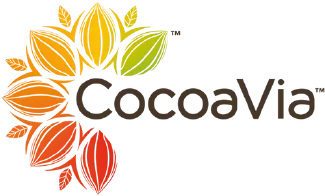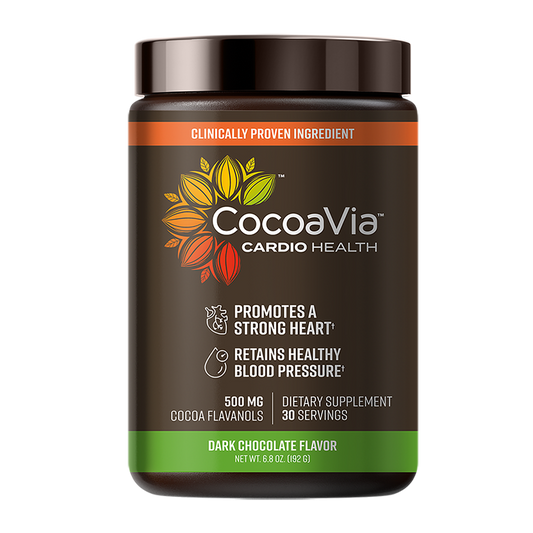
Cardiovascular Support Supplements
What’s the first thing you think of when you hear “cardiovascular health?” Most people think “heart health,” and in its simplest definition that’s true. But cardiovascular health is more than just heart health—it’s your link to total body health. Every single step you take to care for your heart and cardiovascular system is a step you take to care for your most important asset: you!
Why is heart health important?
The cardiovascular system is the engine that powers the entire body, and it relies on your heart to keep the engine running smoothly. But here’s a scary stat: cardiovascular disease is the top cause of cardiovascular morbidity and mortality across the globe.
Fortunately, there are ways to change those statistics for the better, and making heart health a priority is at the top of the list. There are proven ways to keep your ticker in tip-top shape, like:
- Eating a balanced, nutritious diet
- Exercising
- Taking dietary supplements
The more you do to take care of your heart, the better it takes care of you!
What to eat for heart health
What’s the key to eating for optimal heart health? Noshing on nutrient-rich foods! Focusing on foods that have minerals, protein, whole grains and other nutrients is a great start. Here are a few of our favorites:
Fruits and veggies
The best fruits and vegetables to eat for heart health are … any that you like to eat! That’s right, the American Heart Association says all fruits and vegetables are good for you, and that filling at least half your plate with fruits and veggies makes it easy to eat the recommended 4 ½ cups per day. An added bonus: whether you like fresh, frozen or canned, all produce counts toward your heart-healthy diet!
Chicken and fish
Skinless poultry is usually leaner than beef and tastes great grilled, roasted or baked—which makes this one of our favorite options for a heart-healthy diet. And don’t forget about the omega-3 fatty acids you’ll find in fish like salmon, making this superfood—super!
Nuts and legumes
Boasting a repertoire of protein, fiber and unsaturated fats, nuts and seeds (unsalted is best!) are a tasty snack that support a healthy heart. And the rumor is true: legumes (a fancy word for beans) are good for your heart, and they’re easy to work into soups, salads and pasta dishes. If you’re feeling adventurous, try this Buffalo White Bean Hummus recipe!
There’s a wide variety of nutrient-rich foods to help boost your heart health. The American Heart Association offers lifestyle recommendations, including reading Nutrition Facts panels on foods for the amount of healthy (and not-so-healthy) nutrients in your foods and beverages.
Exercises That Improve Heart Health
Being physically active is one of the best ways to build a stronger–and healthier—heart. And while any exercise is better than no exercise, we have a few favorites that help support heart health whether you’re a beginner or an exercise aficionado!
Aerobic Exercise
Working up a sweat through moderate-intensity aerobic activity for at least 150 minutes per week does more than just boost heart health—it’s linked with better sleep, memory, balance and cognitive ability, too! If you’re ready to make your heart beat faster, add intensity to your workout. What’s the best workout for boosting heart health? Whichever type of exercise you like and will build into your routine. Walking is one of our favorites since you can do it anywhere (even inside your house!) and don’t need any equipment to get started.
Resistance Training
Resistance and strength training exercises not only help protect your body from injury, they lead to a boost in your metabolic rate—which means burning more calories even when your body’s at rest. One set of eight to 12 repetitions, working the muscles to the point of fatigue, is usually best, and you should add strength and resistance training twice a week for optimal results.
Stretching, Flexibility and Balance
Yoga, tai chi, Pilates and simple stretches are great ways to improve balance and freedom of movement every day. You can do these exercises daily if you’d like, but older adults at risk of falls should do balance training at least three days per week. While stretching, flexibility and balance exercises don’t directly impact heart health, there’s a good reason top heart experts recommend them: they keep our bodies healthy and ready to take on aerobic activity several days a week!
The Best Supplements for Cardiovascular Support
There’s no shortage of information about how supplements may benefit heart health, but it’s hard to know what really works. Here are a few that are scientifically proven to support cardiovascular health … and a few where the jury’s still out!
Cocoa Flavanols
Cocoa flavanols stand out as one of the most highly-researched plant-based nutrients in the world. And that research proves daily consumption of high levels of cocoa flavanols help support a healthy heart by promoting healthy blood flow and increasing your body’s natural production of nitric oxide. Thanks to the benefits of nitric oxide on your arteries, taking cocoa flavanols can also support health blood pressure—another plus for heart health! Since traditional processing can destroy cocoa flavanols, taking a supplement may be your best bet. CocoaVia™ guarantees the highest level of cocoa flavanols on the market and has a proprietary process for extracting cocoa flavanols from natural cocoa beans at the highest concentration possible.
Red Yeast Rice
Known for its potential to support healthy cholesterol and lipid levels, red yeast rice is a traditional Chinese culinary and medicinal product. In the U.S., dietary supplements containing red yeast rice have been marketed to help lower blood levels of cholesterol and related lipids, but the National Institutes of Health’s National Center for Complementary and Integrative Health warns these supplements may not be safe—and might even contain a potentially harmful contaminate, so do your research before you add these to your heart-health regimen.
L-Carnitine
Carnitine is found in nearly all cells of the body and is the generic term for a number of compounds—including L-Carnitine. Some research suggests that L-carnitine might have beneficial effects on the cardiovascular system. But there’s a catch—you need to take it for as long as a year and only helps in certain settings. More research is needed to fully understand the effects of carnitine on cardiovascular health, but there’s good news: our bodies make sufficient carnitine to meet the needs of most people.
Coenzyme Q10
Coenzyme Q10, or CoQ10 as it’s more commonly known, helps support cellular energy production in the mitochondria, the powerhouses of most cells. How can this support your heart? The highest concentrations of mitochondria are found where cells are working their hardest, including—you guessed it—your heart! Replenishing CoQ10 levels in the body with a supplement can help support heart function.
Magnesium
An essential mineral that helps support nerve, muscle and heart function, it’s also known to promote a steady heart rhythm. While getting plenty of magnesium through the foods you eat is ideal, taking a supplement can support heart health too!
Omega 3 Fatty Acids
Fish oil helps support a healthy heart by providing omega-3 fatty acids EPA and DHA. There’s even research that, while not conclusive, suggests consuming EPA and DHA omega-3 fatty acids can be an important part of heart health. If you’re not a fan of eating fish, flaxseed oil supplements are excellent plant-based options.
Conclusion
Cardiovascular health is the key to total body health and making it a priority should be at the top of any health to-do list! You can these simple steps to support your cardiovascular health, keeping yourself strong from the inside out:
- Eat a diet full of nutrient-rich foods like fruits and veggies, nuts, legumes, fish and other lean meats
- Aim to get a total of 150 minutes of aerobic exercise throughout the week
- Incorporate two sessions of strength training, along with some balance work, to your weekly fitness routine
- Be smart about your supplements: make sure the ones you choose are proven to be effective for supporting heart health
The bottom line: there are many choices you can make to maintain your heart health. A well-rounded routine of healthy eating, exercise and heart-healthy supplements are a great start! And, as always, it’s best to check with your healthcare professional before making diet and lifestyle changes!
CocoaVia™ Cardio Health Products
-
CocoaVia™ Cardio Health Powder
Support heart health with every scoopRegular price From $49.99 $1.66 per dayRegular price Sale price From $49.99 $1.66 per dayUnit price / per -
CocoaVia™ 500mg Cocoa Flavanols Capsules
Support heart health with concentrated capsulesRegular price From $48.99 $1.63 per dayRegular price Sale price From $48.99 $1.63 per dayUnit price / per



